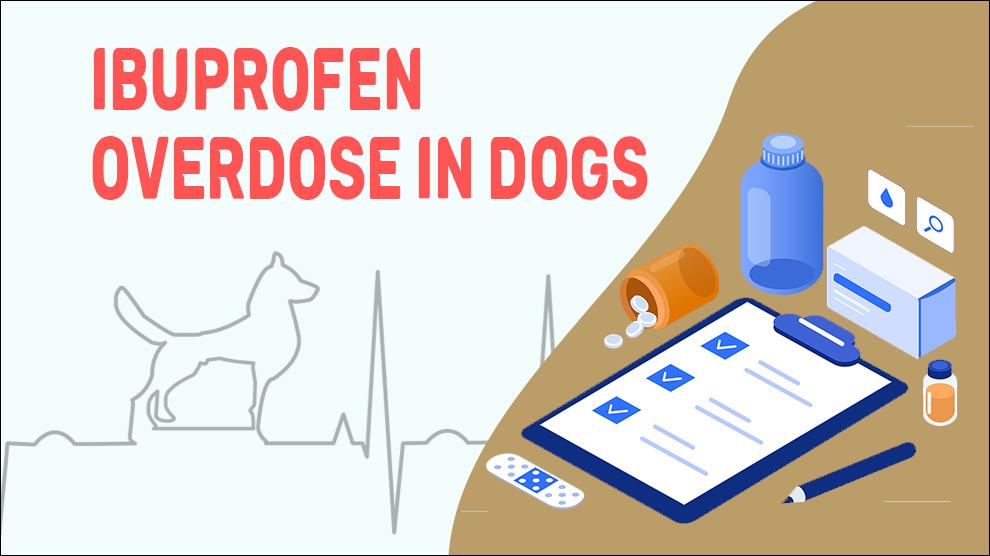Ibuprofen is a popular over-the-counter (OTC) non-steroidal anti-inflammatory drug (NSAID) class of medication used to treat mild to moderate pain, fever, inflammatory diseases, rheumatoid disorders, osteoarthritis, and dysmenorrhea.
Ibuprofen (2-(4-isobutylphenyl) propionic acid) human formulations include Advil® (Whitehall-Robins), Motrin® (McNeil), Haltran® (Lee Pharmaceutical), PediaCare (Pharmacia & Upjohn), Menadol® (Rugby), Midol® (Bayer), and several other generic forms of ibuprofen.
Unfortunately due to its popularity in the medicine cabinets, it can be accidentally ingested by our pets and has a narrow margin of safety for dogs and cats.
Although relatively safe in humans, ibuprofen can easily reach threshold toxic levels in dogs. Signs of toxicosis can appear for as little as 200 mg ingestion happens to a 10-12 kg dog. For Medium-sized dogs (such as 12-18 kg)- 500 mg and for large dogs of size 20-30 kg – 900 mg ingestion is enough to cause GI irritation and ulceration, Larger doses will cause azotemia, renal effects, and results in kidney failure.
The US Animal Poison Control Center had approximately 5000 ibuprofen poisoning cases reported in the last decade, both from accidental ingestion of human medication and overdose of Ibuprofen that was prescribed to dogs.
The most common causes of Ibuprofen poisoning are misuse or off-label use or unintentional usage by the owner (e.g. giving the pet an OTC pain medication used by humans), accidental ingestion from a bottle left open, or a lid chewed off by your dog.
Symptoms Of Ibuprofen Overdose
- Recurrent vomiting with or without blood
- Lethargy
- Diarrhea
- Bloody stools that are black or red (melena)
- Abdominal pain
- Inappetence
- Azotemia
- Pale or white mucous membranes
- Gum ulcers
- Stumbling
- Weakness
Treatment Options For Ibuprofen Overdose
The risk for serious toxicity can be reduced by early treatment and decontamination.
Within a few hours of Ibuprofen ingestion, the veterinarian may provoke vomiting or perform gastric lavage (clearing out the stomach contents).
- Vets will clear out the fillings and a special solution of activated charcoal (liquid) is provided to decelerate the drug/poison absorption within the stomach.
- A licensed vet/ toxicologist should only administer activated charcoal Or else, life-threatening changes in levels of sodium and aspiration into the lungs may occur.
- For pets with high blood methemoglobin levels or liver damage, more intensive therapy is needed.
- For any gastric perforation - Surgical intervention may be necessary.
- Anti-seizure medication (e.g., drugs like potassium bromide, phenobarbital, Levetiracetam, Premidone, etc.
- Liver protectants, Vitamin C, and dextrose fluids.
Home Remedies For Ibuprofen Overdose
If you suspect a toxic exposure, act immediately and reach out to clinics nearby.
Ibuprofen overdose follow-up care for dogs and puppies is providing dietary support, and frequent clinical checking of Blood glutathione levels and methemoglobinemia.
Prevention Of Ibuprofen Overdose
- Ibuprofen should only be given to dogs under a vet's recommendation.
- Treatment in clinically affected pets may be prolonged and expensive so prevention is better than cure.
- The weight of the dog and dosage should be always taken into consideration.
- Household medications should be kept out of their dog's reach to avoid a potentially harmful reaction.
Affected Breeds Of Ibuprofen Overdose
There is no breed disposition.
Additional Facts For Ibuprofen Overdose
1. Causes:
There are four scenarios that can lead to Ibuprofen poisoning in dogs.
- Any dose of a human medication
- Overdose of a prescribed medication
- Misuse of prescribed medication
- Off-label use
Sometimes, you may follow the prescription recommendations but can result in an overdose. The pet may no longer require an already prescribed dosage dose of medication for some diseases such as diabetes. Prediction is not possible in this case.
2. Morbidity:
Dogs recommended dosage: 5 mg/kg/ daily
=8-16 mg/kg- 7 mg/kg (gastrointestinal signs)
=100 mg/kg (vomiting, diarrhea, abdominal pain)
>200 -300mg mg/kg (ataxia, seizures, renal failure)
3. Mortality:
Ibuprofen overdose in dogs is fatal and the mortality rate is actually higher. Worldwide data is not available; however, country-wise data itself suggest medicine poisoning causes high fatality in dogs.
4. Diagnosis:
- Blood pressure, heart function tests
- Urine tests
- Additional tests for kidney or liver
5. Prognosis:
Prognosis will depend on the ingested quantity, proper diagnosis, and the timing of treatment. Earlier the diagnosis, recovery is good.
Very severe overdoses in dogs can be treated successfully if they get to the veterinarian right away. Mild cases may cause deaths if the poisoning was not found out until the dog succumbs or the cause is unknown.
When To See A Vet
Contact your vet right away, if you notice any of the following:
- Frequent vomiting
- Uncontrolled diarrhea
Food Suggestions For Ibuprofen Overdose
- Food—offered 24 hours after initiation of treatment
- Start with a Bland diet- White Rice, boiled lean meat such as chicken or turkey
- After 2 or 3 days, switch to Low fat, low carbohydrate, and high protein meals
- Broccoli, kale and Brussels sprouts
- Potatoes or Sweet Potatoes, Boiled Chicken Breast
- DHA – herring, sardines, salmon, and cod
Conclusion
Ibuprofen is an over-the-counter oral medication used for pain relief and fever reduction in people. Ibuprofen toxicity can be serious. Yet, pets can survive if the condition is identified, diagnosed, and treated promptly.

















